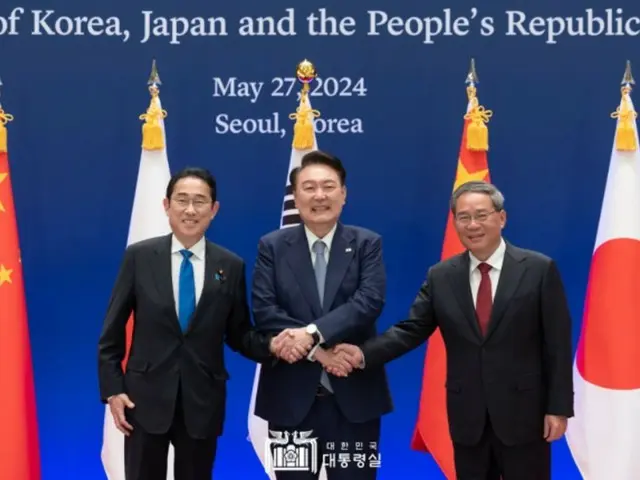After the meeting, the three leaders, including President Yoon Seok-yeol and President Moon Jae-in, adopted a joint declaration. They confirmed that they would hold regular Japan-China-ROK summits in the future and cooperate in six areas, including economy and trade.
The difference in attitude between Japan, South Korea and China has become clear. Since 2008, the Japan-China-South Korea summit has been held independently, rather than in conjunction with international conferences.
The two sides have met periodically on a rotating basis to discuss issues such as how to respond to North Korea's nuclear and missile development, as well as economic cooperation.
The summit was held in Chengdu, Sichuan Province, China in December 2019, and aims to foster close cooperation in dealing with North Korea.
They also confirmed that they would promote free trade, including through the Regional Comprehensive Economic Partnership (RCEP) and the Japan-China-Korea Free Trade Agreement (FTA).
However, the event was postponed the following year, 2020, due to the deterioration of Japan-Korea relations and the spread of the COVID-19 virus.
It was not held in 2021, 2022, or even last year. In March of last year, Prime Minister Kishida said at a joint press conference with South Korean President Yoon, who visited Japan, "We are looking forward to a high-level Japan-Korea-China pro-democracy summit."
"We agreed on the importance of restarting the process as soon as possible," he said, showing his eagerness to resume the Japan-China-South Korea summit.
Then-Foreign Minister Shinzo Abe said he hoped to work toward an early summit between the three countries. In response, Foreign Minister Yoko Kamikawa made a positive remark about the summit, but Chinese Foreign Minister Wang Yi did not directly
However, the three foreign ministers agreed to accelerate work to hold the summit "as soon as possible at an appropriate time."
China initially tried to approach Japan and South Korea in response to the intensifying conflict with the United States, but
However, as the US-China summit was held in April 2018 and the mood for dialogue with the US spread, the US became reluctant to hold talks with Japan and South Korea.
However, South Korea, the chair country, took the lead in pushing for the event to be held, and after a gap of about four and a half years, the event was finally held on the 27th.
The main topics of the meeting were diplomacy, security, trade, and people-to-people exchanges. The three leaders agreed to hold regular tripartite summits in the future, as frequent communication is necessary to deepen mutual understanding and trust.
They also agreed to accelerate negotiations on the Japan-China-Korea Free Trade Agreement (FTA), which was suspended in 2019. In terms of people-to-people exchanges, the next two years will be designated as the Japan-China-Korea Cultural Exchange Year.
The two sides agreed to promote exchange programs between universities and aim to have 40 million people visit each other through tourism and other means by the end of 2030. The joint declaration adopted after the meeting included the following points: 1) People-to-people exchanges
2) Sustainable development through responses to climate change, etc. 3) Economic cooperation and trade 4) Public health and ageing society
5) Science and technology cooperation and digital transformation (DX), 6) Disaster relief and safety - We will promote collaboration in six areas.
On the other hand, there is a difference in perception between Japan, South Korea, and China regarding security, and the Joint Declaration did not address this issue in depth. Regarding the North Korean issue,
The two leaders agreed on the issue, but did not come up with any concrete solutions. The Yomiuri Shimbun reported, "The outcome document of the previous summit stated, 'We are committed to the complete denuclearization of the Korean Peninsula.'"
"The Korean Peninsula denuclearization was merely stated as 'each side emphasized their position.'" The South Korean newspaper JoongAng Ilbo also cited a statement that "the goal is the complete denuclearization of the Korean Peninsula."
"This phrase was not included in the declaration," he said, adding, "This differs from the fact that China agreed to the expression 'striving toward the complete denuclearization of the Korean Peninsula' during the meeting."
Meanwhile, the South Korean newspaper Dong-A Ilbo reported that "the very fact that the three-party meeting was resumed after a long hiatus is a testament to the communist
"The significance of this is that it has created momentum for the future of the international community," he said. "Supply chain issues such as semiconductors, arms trade between North Korea and Russia, North Korea's denuclearization, and the Taiwan Strait issue.
That is why they are trying to put aside tensions and other issues for the time being and find common denominators on long-term issues of cooperation such as climate change and disaster response," he said. "This meeting has been an opportunity to reverse the trend of a fierce new Cold War confrontation."
"It is significant that the three countries of South Korea, China and Japan are embarking on 'interference diplomacy' in the midst of this situation," he argued. Japan will chair the next summit. NHK reported, "As the next chair, Japan will
"With pending issues with South Korea, the issue is whether we can make the meetings a regular event and strengthen ties."
2024/05/28 13:47 KST
Copyrights(C)wowkorea.jp 5

